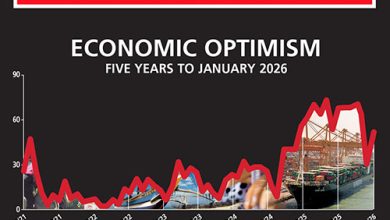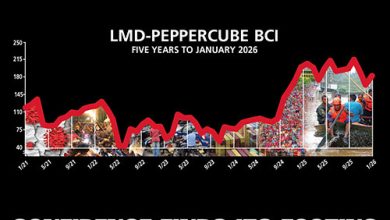BUSINESS SENTIMENT

Early November marked the countdown to the much anticipated national budget for 2017, with corporate bigwigs speculating on whether the government’s fiscal policy brief for next year would prove to be more pro-business than its predecessor or a mere continuation of the same formula.
PRE-BUDGET INDEX MELTDOWN
Businesspeople took a step back ahead of the recently presented budget proposals
This month’s report on the LMD-Nielsen Business Confidence Index (BCI) relates to the latest monthly survey, which was conducted in the first seven days of November – i.e. ahead of the budget presented to parliament on 10 November.
Nielsen predicted in this column last month that the BCI will be subject to volatility in the short term, and that this comes from the numerous policy changes that would be proposed and implemented by the government. And indeed, the latest poll appears to support this assertion.
THE INDEX The BCI fell sharply to 144 in November, compared to 165 in the previous month, reversing most of the gains made since July. Moreover, the 21 basis points it shed in November is the BCI’s steepest decline since October last year.
“While there is visible improvement on key infrastructure project execution and clarity on policy from the government, the environment and policy is still not seen as being conducive for investment growth,” observes Nielsen’s Managing Director Sharang Pant.
He also explains that “inflation and interest rates remain as concerns, and the increase in VAT from 1 November is seen as being detrimental to certain businesses. Both capital and workforce expansion are therefore taking a backseat. More than two-thirds of respondents talk about maintaining their workforce, with no plans to increase [staff] in the next six months.”

THE ECONOMY Four-in-10 respondents (down from 45% in October but more than 10% higher than four months ago) are of the view that the Sri Lankan economy will improve in the coming 12 months, versus 34 percent and 26 percent who expect economic conditions to stay the same or get worse respectively.
In the words of a business executive, “the economy seems to be on the rise and new investment opportunities seem to be coming up, which is a positive sign.”
BIZ PROSPECTS As for sales volumes in the next 12 months, nearly a fifth of the sample population expect to be worse off whereas only three percent were as pessimistic in October. Nevertheless, the majority (63%) of those surveyed continue to hold a positive outlook on their business prospects.
At the same time, the VAT rate hike does appear to be affecting sentiment regarding future business, with one respondent pointing out that “prospects do not look very positive as the increase in VAT will have a big impact on our revenues. We will need to reconsider our sales forecasts for the coming year as well.”
“As a result of the VAT rate increase, many companies’ sales targets are going to be affected for the remainder of this year as well as next year,” another corporate executive laments.
On the other hand, 50 percent of the survey sample – i.e. the same result as in October – feel that business will improve in the next three months.
Nearly a quarter of those consulted by the pollsters say that sales volumes ‘will get worse’ during this period, while a slightly higher number (27 of the 100 executives spoken to by the pollsters) expect business to ‘stay the same.’
INVESTMENT Less than a third of respondents view the current investment climate in a positive light, while a majority (43%) deem it to be ‘fair’ and just over a quarter are far from impressed.
On the plus side, a businessperson notes: “There are a few ongoing development projects, which is a good sign. The government now needs to build on this and encourage more companies to invest, as well as attract more foreign investment.”
A decidedly less optimistic survey respondent claims that “Sri Lanka’s investment climate is poor as there is no proper backing or incentives given by the government to invest. Many organisations are not showing any interest or aren’t willing to take the risk.”
Another interviewee stresses that “with interest rates on the rise, this is going to have an impact on investment spending.”
WORKFORCE In terms of the staffing requirements of BCI survey respondents’ workplaces, 28 percent say the companies they represent plan to increase their workforce in the coming six months, whereas a much healthier 36 percent said so in October.
Meanwhile, retaining human resources at existing levels is a priority for the majority (68%, versus 62% in the previous month) of respondents, while only four percent of those polled state that their companies plan to downsize in the next six months.

PROJECTIONS It may not be a mere coincidence that the BCI now stands at roughly where it was in May, which was when the VAT rate hike was to be implemented – yes, it takes that long for government policy to be implemented these days!
The index is also at a point where its average has been in the last 12 months, so perhaps this reflects a stabilisation of sorts… for the time being at least. The December survey however, will be the eye-opener as it will all but convey a verdict on the budget proposals by businesspeople.
In a nutshell, we expect the index to fall yet again in the light of the burdens that have befallen businesses – unless corporates take a long-term view that fiscal consolidation is a dire need in the interest of the nation and that it is fair to expect them to take the hit.





